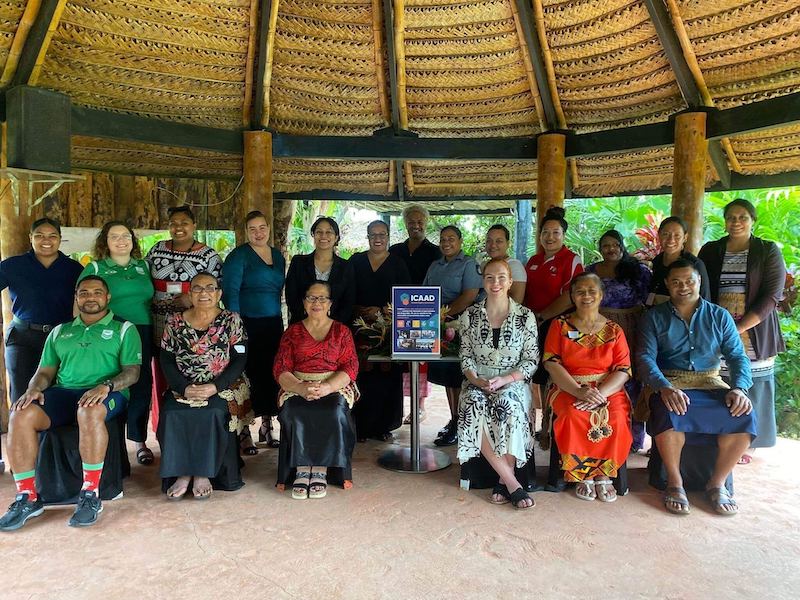
On Friday 28 April, 25 stakeholders representing civil society and government came together for a workshop focused on how gender-bias and discrimination manifest in the justice system, and how to address this in order to better support victims/survivors of gender-based violence.
The workshop, “TrackGBV Tonga: Improving Access to Justice for Gender-based Violence Cases Training”, was facilitated by ICAAD and Tapuaki Mei Langi Consultancy, and funded by Families Free of Violence.
The Honourable Chief Justice Whitten opened the training and shared:
“Discrimination, inequality, and gender bias have also been found to affect sentencing which can, in turn, impede access to the experience in attaining and the quality of justice for victims and survivors of gender-based violence. The importance, therefore, of knowledge and meaningful responses by all stakeholders including the courts cannot be overstated. To that end, we very much welcome this training to review ICAAD’s analysis of thousands of sentencing decisions in the Pacific including 55 from Tonga.”
Part I: Exploring the Data
In the first part of the training, participants explored key concepts of gender-based violence, gender stereotypes, and gender discrimination, and reviewed Tonga’s database analyzing gender-based violence cases. ICAAD’s TrackGBV Dashboard features 2,492 gender-based violence sentencing decisions from seven Pacific countries, including 55 cases from the Supreme Court and Court of Appeals in Tonga. ICAAD’s new Tonga Country Report dives deeper into trends over time in Tonga and regional comparisons.
Tonga has the third highest rate of contentious factors raised in sentencing decisions across the seven jurisdictions, at 81.8%, falling close behind Papua New Guinea and Vanuatu. Those contentious factors, including gender stereotypes, rape myths and customary practices, were used to justify a reduction in sentences in 43.6% of cases.
Lavinia Palei, from the Ministry of Internal Affairs, Women’s Affairs and Gender Equality Division shared that she was surprised to find that: “Tonga is the highest in the Pacific for partially and fully suspended sentences in GBV cases (63.6%).” Sentences can be partially or fully suspended based on several factors that include: first-time offender, advanced age or poor health, sincere remorse, and restitution. However, they must be counterbalanced by the severity of the crime. These decisions are at the discretion of the judge, but can often be influenced by contentious factors.
Olivia Fa, a Facilitator with Salvation Army, noted her new knowledge about how first time offender status is misapplied. The TrackGBV methodology tags cases in which a perpetrator was granted first time offender status unjustifiably, meaning that the evidence presented in court established a history of violence that was unchallenged by the defendant, yet the defendant was still considered a first time offender.
Betty Blake, the Director of Ma’a Fafine mo e Famili (MFF), shared, “I gained a deeper understanding of the legal system and learned a lot from the sharing from our trainer and other participants.”
Part II: Developing Recommendations
In the second part of the training, participants developed a set of recommendations based on the TrackGBV review and their own insights. The cohort’s recommendations were shared with Chief Justice Whitten and broader stakeholders, and included:
- Reduce and eliminate the use of contentious factors especially customary practices, religious and community testimony (personal and via reference letters), and gender stereotypes;
- Ensure rulings from Magistrate Courts are documented and uploaded to PacLII for transparency;
- Eliminate the use of the sole breadwinner argument in mitigating sentences and collaborate with key government partners to provide financial assistance to victims/ survivors whose perpetrator is also the breadwinner;
- Liaise with contracted rehabilitation programs (e.g. Salvation Army) to ensure that progress reports come back to Court; and
- Establish mandatory minimum sentences for GBV related charges.
Participants highlighted the need for human rights, gender equality, accountability, safety, fairness, and dignity to underpin the sentencing of GBV cases.
Participants were also eager for more data to be collected and analyzed for Magistrate Court decisions, recidivism rates, case attrition through the courts, referral pathways, and average timelines for court hearings and proceedings. The lack of comprehensive data is an issue across the Pacific Islands, and better data collection goes a long way to ensuring the gaps in access to justice are properly identified and mitigated.
ICAAD’s Director and Change Facilitator, Erin Thomas, shared:
“It’s heartening to see such a diverse group of stakeholders coming together with clarity around a path forward. While we were focused on the Courts, their recommendations require a whole-of-government approach to ensuring access to justice is upheld as a standard and that key implementers are funded accordingly.”
Participants represented the following organizations and agencies: Family Protection Legal Aid Centre, Ministry of Justice; Ministry of Internal Affairs, Women’s Affairs and Gender Equality Division; Ombusdman’s Office; Tonga Police DV Unit; Ministry of Health; Ma’a Fafine mo e Famili (MFF); Salvation Army; Tonga Family Planning Association; Faanunu & Afu Professional Services Ltd; Families Free of Violence; NRL in Tonga; and UN Women.


